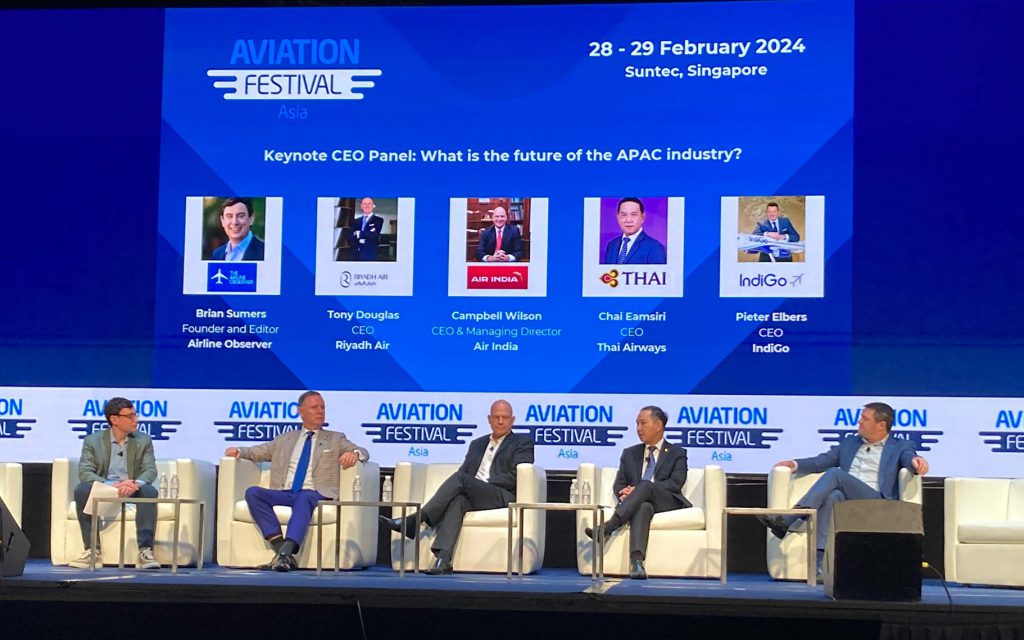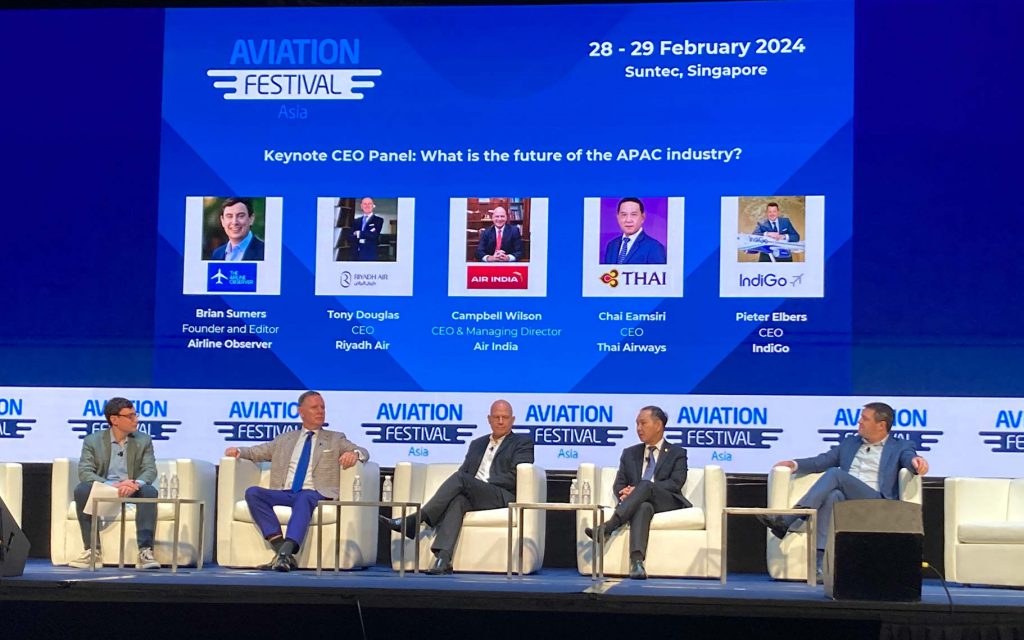Airline chiefs of legacy, low-cost carriers (LCC) and new full-service start-ups, who spoke at the recent Aviation Festival Asia in Singapore, have one thing in common – the need for additional aircraft to meet growing passenger demand and expansion of their domestic and international networks.
Air India, under new Tata Group management since 2022, has 506 orders, 36 on lease and is accepting one aircraft delivery every six days. Air India CEO and managing director Campbell Wilson is expecting “some delays” on its orders 18 months into its five-year transformation, noting the airline is “undersized in relation to the market”.

IndiGo is the largest airline in India by passengers carried and fleet size, and the LCC has a 60 per cent share of the domestic market. IndiGo CEO Pieter Elbers reported growth of 20 per cent in the past year and its 2024 network will comprise 86 domestic and 33 international destinations, adding that the airline’s target is to grow from 300 to 1,000 aircraft to “double in size by the end of the decade”.
New player Saudi Arabia’s Riyadh Air was launched some 15 months ago and is in an alliance with Turkish Airlines. According to CEO Tony Douglas, the start-up is looking to fly to some 150 destinations, has an order for 72 aircraft, and expects to start operations by mid-2025.
On another panel, CEO of Really Cool Airlines Patel Sarasin said the new Thai full-service international player is scheduled to take off by the end of the year but shared he was facing challenges in finding aircraft.
Fellow panellist Mike Szucs, CEO of Cebu Pacific, said he was negotiating with Airbus and Boeing for 150 aircraft to tap domestic and international opportunities with major improvements in the country’s airport infrastructure under way.
However, airlines have little control over the delivery of their aircraft orders.
Douglas admitted Riyadh Air has “no Plan B” in the current situation of demand chasing supply; while Elbers acknowledged there were supply chain challenges and original equipment manufacturer issues.
On how Thai Airways is coping with passenger demand changes following China’s reopening, CEO Chai Eamsiri said Chinese state-owned enterprises were controlling the flow of outbound travel and the airline was managing its aircraft deployment by serving only 42 routes, less than 80 per cent of pre-pandemic levels.
For Riyadh Air, Douglas noted that China, described as a giant market, is on its “list of top priorities”, adding “we have to go to China and will use social media” to promote its appeal to football-mad supporters – Cristiano Ronaldo captains Saudi Pro League Al Nasser – and adventure seekers as host of the Dakar Rally.
Airlines also have no clear answer on how to get to net zero carbon emissions, identified as one of the industry’s biggest challenges even though low-carbon and sustainable fuel are available.
Chai commented carbon neutrality was not just the responsibility of airlines and “everyone has to pay for it”.
While the airlines are ready, where there are mandates in Europe and where the Schengen region and the US have also introduced incentives, he said more guidelines are needed in Asia.
Chai referenced the February announcement that flights departing from Singapore will be required to use sustainable aviation fuel (SAF) from 2026, in a move aimed at progressively decarbonising airline operations.
Singapore is aiming for a one per cent SAF uplift and passengers will have to pay more for their air tickets due to a levy imposed on the purchase of the fuel with fees paid based on factors such as distance travelled and class of travel.
The rest of South-east Asia, even the Thai government, Chai pointed out, have no comprehensive policy on SAF and the national carrier is pushing for clearer concrete solutions on its availability in the market.
While no mention was made during the panels on recent incidents of missing aircraft door plugs or tricky pilot seat switches having a knock-on effect on delivery and capacity rebuilding, passengers will have to brace themselves for higher ticket prices as airlines wait for orders and what else is to come as governments and the industry work out the route to net zero carbon emissions.

